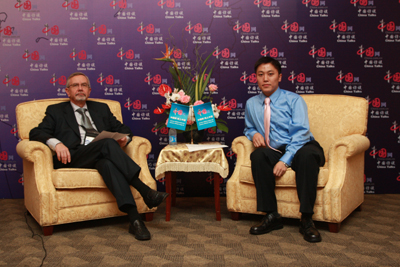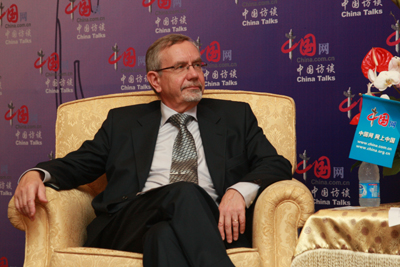By Wang Ke
China.org.cn staff reporter in Shanghai
|

|
|
Karl-Johan (JUHANI) L?nnroth (Left), Director General of the Directorate-General for Translation of the European Commission, gives an interview to China.org.cn on August 5,2008 in Shanghai, China. [China.org.cn]
|
|

|
|
Karl-Johan (JUHANI) L?nnroth, Director-General of the Directorate-General for Translation of the European Commission, gives an interview to China.org.cn on August 5,2008 in Shanghai, China. [China.org.cn]
|
The European Commission's Directorate-General for Translation is one of the largest translation services in the world. It has a permanent staff of some 1,750 linguists and 600 support staff, and uses freelance translators from many different countries. Karl-Johan (JUHANI) L?nnroth is the Director General of the DGT of the European Commission. In an interview with China.org.cn, Karl-Johan L?nnroth talked about how his office promotes the translation industry in European countries as well as how it facilitates new computer technologies. The Director-General also shared his expectation for cooperation with China in future translation work.
transcript:
China.org.cn: Welcome to China Talk. I'm Wang Ke. Shanghai is holding the 18th World Congress of the International Federation of Translators (FIT). Distinguished interpreters and translators are gathering here from all over the world. Today we are honored to invite Director of Translation for the European Commission Karl-Johan (JUHANI) L?NNROTH, to "China Talk." Welcome.
JUHANI Lonnroth: Thank you very much
China.org.cn: You are the director of DGT, would you like firstly to intro your department to our audiences and what's its function in the European Union?
JUHANI Lonnroth: Well I work in the European Commission which is the executive organization of the European Union. In other words the commission presents, as it were, all the initial and all the propositions for legislation which concerns citizens. My directorate-general is actually the largest directorate-general of the whole commission. But it is also said to be the largest public translation service in the world. We have 2,500 staff and we translate about 2 million pages per year for the benefit of the European Union's enterprises, citizens, and EU's member states.
China.org.cn: That's a really big staff.
JUHANI Lonnroth: It's a big operation and we work in 23 languages. When we started 50 years ago – we had the 50th anniversary – we had only four languages and 24 people who helped us with the translation. Now we are grown about 100 times what we used to be.
China.org.cn: Your department developed so fast. The European Union has many member countries, as you mentioned, using more than 23 languages. Would you like to introduce the current situation for translators in the European Union?
JUHANI Lonnroth: Well, what we actually do is we are helping the citizens or helping the commission to interact with citizens of Europe and the European Union member states. they have all brought in when they became members their official language and this is why in order to enable the citizens to understand what the decisions are which concern them we have to translate all these legal acts into their own language, otherwise the European Union would not be legitimate in the minds of the citizens; It would be too complicated for the citizens.
China.org.cn: In other words, one document has to be translated into 23 languages? 23 versions?
JUHANI Lonnroth: Yes, this is true. No legal act in the European Union actually enters into force. It will not be applicable to any of the citizens unless it has been translated into all of these 23 languages.